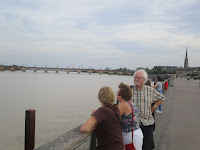It’s that time of year when the sun, sea, sand, good friends
and good French wine calls
.
This year we flew into Bordeaux to meet up with Dave n Sue
for a tour and sleep over. Much of Bordeaux suffered in the war and has had to
be redeveloped. The city is beautifully restored and has an ultra-modern
public transport system. The “Port of the Moon” is also now a UNESCO World
Heritage Site. The Stone Bridge, with its 17 arches, crosses the Garonne,
offering pedestrians a lovely view over the docks and harbour. It is a testament to the city that the new blends seamlessly
with the new. There is also an ongoing programme of external brick cleaning
that enables the limestone to reflect the sun in a clean, crisp manor. They are also leaders in creative water
storage and recycling, green planting and community integration and transport
initiatives.
There is also some majestic street art:
 |
| horses with finned feet |
 |
| Liberty |
 |
| face appears and disappears depending on the light |
 |
| original idea with chairs |
Had some wonderful food and drank red wine at the temple of
Bacchus in this wedge shaped building. :-p

 |
| Hmmm what to choose? |
One of the main water conservation systems also provides a
very shallow surface water feature, great for children to play in, but also
forms a mirror surface when calm that reflects the surrounding buildings.
 Time for R&R in Vaux sur Mer. Between there and St
Palais there are three of the best beaches in the region.
Time for R&R in Vaux sur Mer. Between there and St
Palais there are three of the best beaches in the region.
Took in an amazing concert at the Abbaye Sablonceaux, one of
a season presented by at various similar venues around the region.
Ensemble Vocal de Caelis, formed in 1998, they specialises in acapella performance
of the Middle Ages in Gregorian style. Within the vaulted Abbey their voices
reverberated in pure surroundsound. It was a truly wonderful performance.
Also
toured Royan with its picturesque harbour -
and
the IIe d’Oleron off the Poitou-Charentes coast south is the largest island off
mainland France except for Corsica, at 34 km by 15 km, and its capital Saint
Pierre. The island is connected to the mainland by a bridge three kilometres
long at Marennes. The main town in the south of the island, Le Château, is
named after the citadelle that still stands, along with some
seventeenth-century fortifications. The town thrives on its traditional
oyster farming and boat building. The chief town in the north is St-Pierre,
whose market square has an unusual thirteenth-century monument, La
Lanterne des Morts.
Then onto La Rochelle. Whilst tracing its development beyond
the mists of time La Rochelle itself was founded during the 10th century and
became an important harbour in the 12th century. In 1137, Guillaume X to all
intents and purposes made La Rochelle a free port and gave it the right to
establish itself as a commune . Fifty years later Eleanor of Aquitaine upheld
the communal charter and for the first time in France, a city mayor was
appointed for La Rochelle. Under the communal charter, the city obtained many
privileges, such as the right to mint its own coins and to operate some
businesses free of royal taxes. La Rochelle's main feature is the "Vieux
Port" - "Old Harbour" - which is at the heart of the city,
picturesque and lined with seafood restaurants. The city walls are walkable and
the narrow winding streets of the old town have been well preserved.
 |
| Oh eck, ere we go again! |
The old port area of La Rochelle is dominated by three C14th
towers that stand at the entrance and is one of the town’s major
tourist attractions. Just over 400 years ago the first settlers to Quebec left
from La Rochelle and Tour de la Chaine (so named ar a link chain could be
raised between the towers to protect the inner harbour). It also hosts some
(hair raising) events - https://www.youtube.com/watch?v=QQk3yk-cKs0
So as the sun slowly sets on another wonderful trip ...
It's time for a last meal and toast at the wonderful Norsicaa
 |
| cheers all |
Here's to our good friends and marvelous hosts and travel guides
Dave n Sue












No comments:
Post a Comment